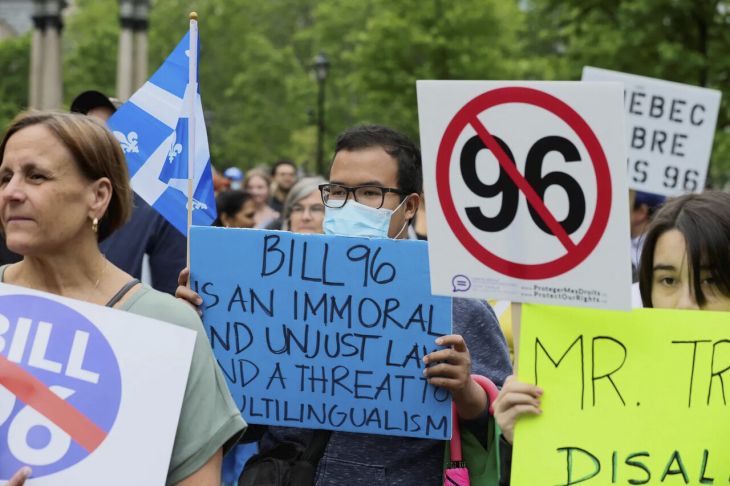Recently, Quebec’s nationalist Premier, François Legault, shepherded through a law further severely limiting the use of English in the province. His ruling party is a right-wing conservative movement with its main political base in rural Quebec and around conservative Quebec City.
While the law goes against the Canadian Bill of Rights, (like all Quebec language laws) a clause in the constitution allows provincial governments to circumvent the Bill of Rights and the constitution when it suits them.
Like previous Quebec governments, Mr. Legault’s government followed suit.
Is there justification for such an attack on individual rights?
If one goes back to the sixties and before, Canada and Quebec were branch plants economies – owned usually by American interests and with a managerial class composed exclusively of white Anglo-Saxon Protestants. French-speaking Catholics, largely encouraged by the church and partly by choice, were marginalized from economic life and relegated to a second-class citizenship.
This changed in the seventies, when successive provincial governments passed legislation making French the only official language of Quebec and forcing companies with a certain number of employees to operate exclusively in French. English language education was limited to children of Quebecers who themselves had been educated in that language and forcing immigrants to attend French language schools.
English rights have never satisfied die-hard Quebec nationalists. In their view, Quebec is an island of French in a sea of English North America. Any presence of English in Quebec is viewed as a threat to the future of the French majority and to their hard-fought control of the province. They view the rights of society as trumping the rights of the individual and feel no compunction at limiting or eliminating individual, mainly minority, human rights when it serves their purpose.
The election in 1976 of the first separatist provincial government led to an exodus of both English and French Quebecers to other parts of Canada. Those who remained in Quebec adapted and learned to work and live in French.
Over the years, nationalists have chipped away at English language rights and focused exclusively on the rights of what they call “Québécois de souche” (Quebecers descendent from the original French colonists).
They, as well as Legault, have promoted an “us vs. them” mentality in Quebec where English speaking Quebecers are perceived to be the enemy of pure Quebecers.
This is the language of nationalists, and, like others before him, Legault is the perfect embodiment of this type of political leader.
Fast forward to 2022.
The global economy knows no national boundaries, and the language of international business and diplomacy is English.
By limiting access to good English language education to all Quebecers (other than the wealthy who can afford to send their children to expensive private or out of province schools), he is depriving generations of Quebecers of the tools that they will need to become effective and competitive players in the global economy.
The 21st century is a time when walls should be coming down rather than going up. Yet, around the world, and in Quebec, we are seeing more walls being built to a political class demanding racial or cultural purity as a test of patriotism.
Former Prime Minister Pierre Trudeau once observed that “there is no such thing as a model or ideal Canadian (or Quebecer for that matter – my words)…A society which emphasizes uniformity is one which creates intolerance and hate”.
This results to trying to get all to conform could well result in the hatred and polarization that we are seeing globally, and Quebec is no exception.
Although many of my Francophone compatriots may disagree, I see this as a form of cultural ethnic cleansing – an attempt to ensure that non “Québécois de souche” leave the province or give up their freedom to choose the language of education for their children or leave only “historical” Quebecers with full political and social rights.
I find this abhorrent.
For forty years I had the privilege of serving as a Canadian diplomat – representing a multicultural society that guaranteed individual rights for all Canadians regardless of whether they were first generation or from families whose presence dated back decades or centuries. These are Canadian values that I continue to support and that go against the objectives of the current Québec administration.
As a Quebecer born of immigrant parents, I grew up in English, French, and Spanish, and enjoyed sharing both French and English culture as well as the cultures of my friends who brought elements of their cultures to Quebec and enriched the lives of all.
I believe that Quebec would be better served if all Quebecers – both English and French – would enjoy an education system that guaranteed that they emerge from high school fully bilingual – capable of living and working in French while being able to compete in a globalized economy where English is the lingua franca.
Ultra-nationalism – demanding that we all conform to a cookie cutter model of linguistic and cultural behavior – has always been anathema to me. For a society to grow, new ideas and new blood must be introduced lest that society be wedded to the past and mired in lethargy.
Todays’ Quebec is less and less part of the Canada that I represented abroad, and its values no longer are mine.
Along with many, I have left.
Those opposed to my views may say good riddance.
To them, I say, good luck in preparing your youth to thrive in a globalized world.
Keep reading: George Bush’s Gaffe
Edition: Estefanía Cardeña
La lectura, además de entretenimiento, es el sustento de la educación
Margarita Robleda Moguel
Más de 35 mil personas vibraron ante temas como 'Así Soy', 'Soledad', 'Te Iré a Buscar' y 'Mar y Tierra'
La Jornada Maya
El impacto se deriva de desarrollos inmobiliarios y viviendas irregulares en los humedales
La Jornada Maya
Sarah Schleper fue descalificada en el slalom gigante de los juegos
Ap
